
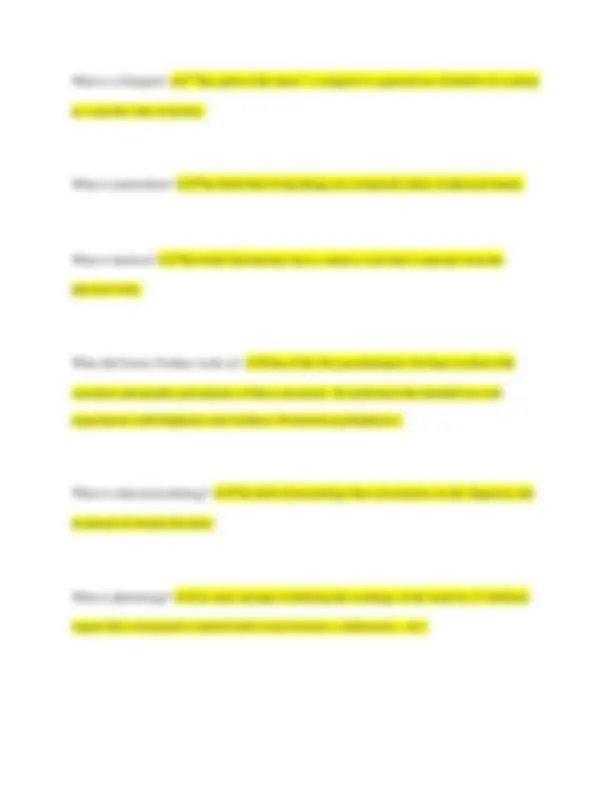
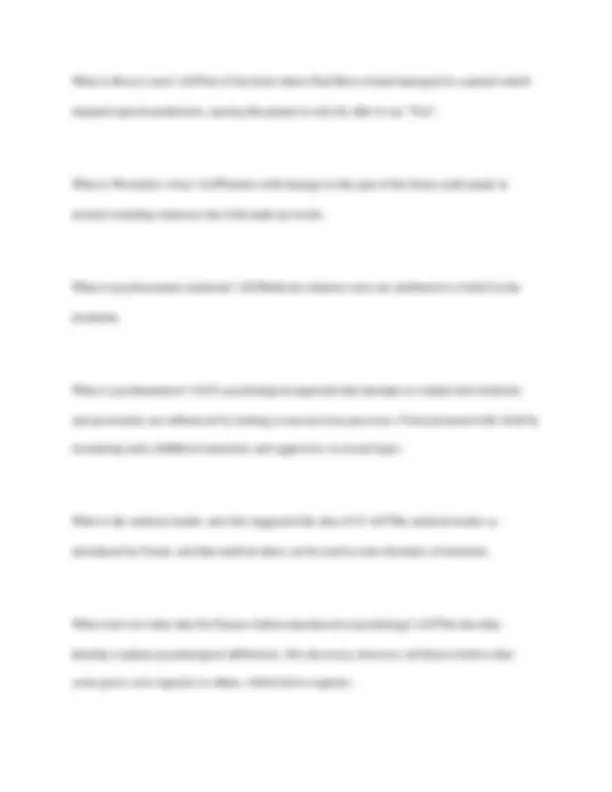
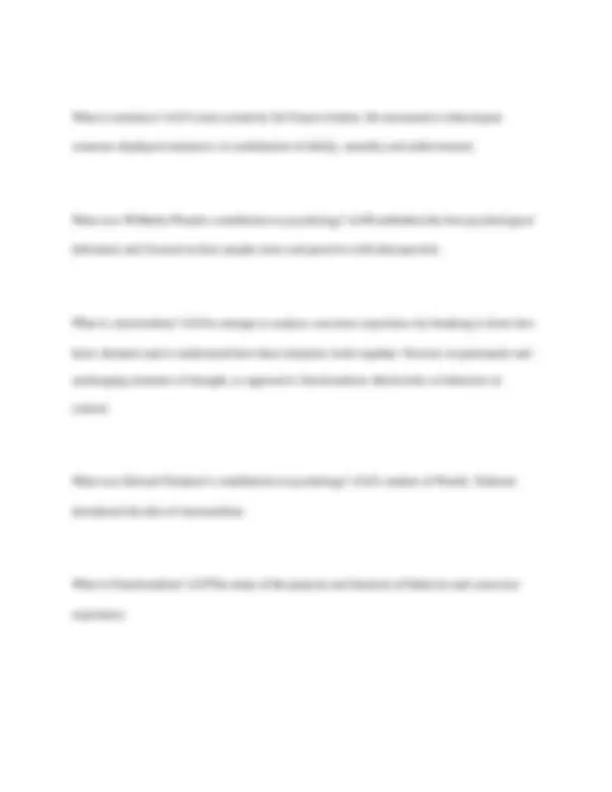
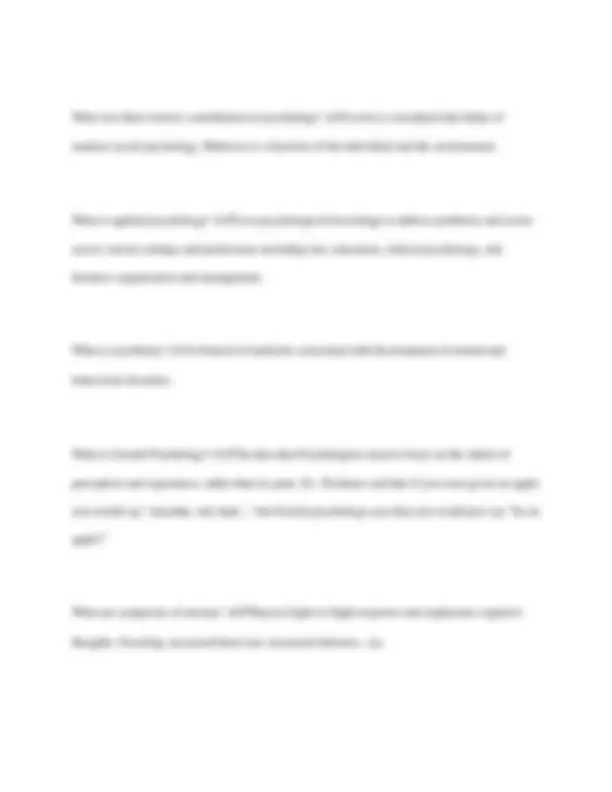
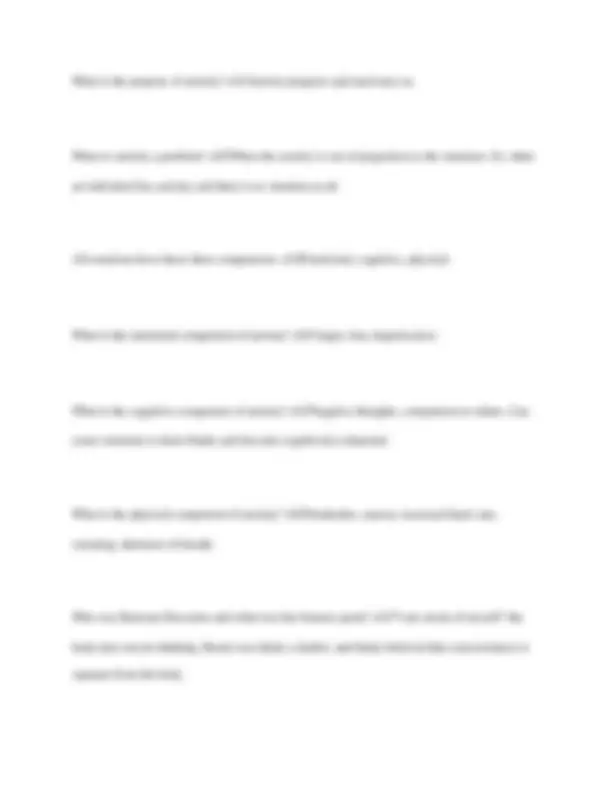
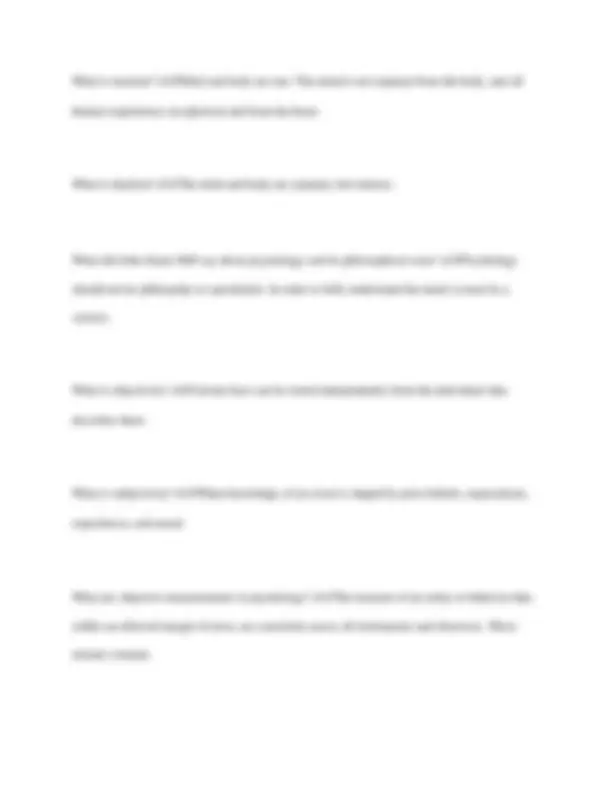
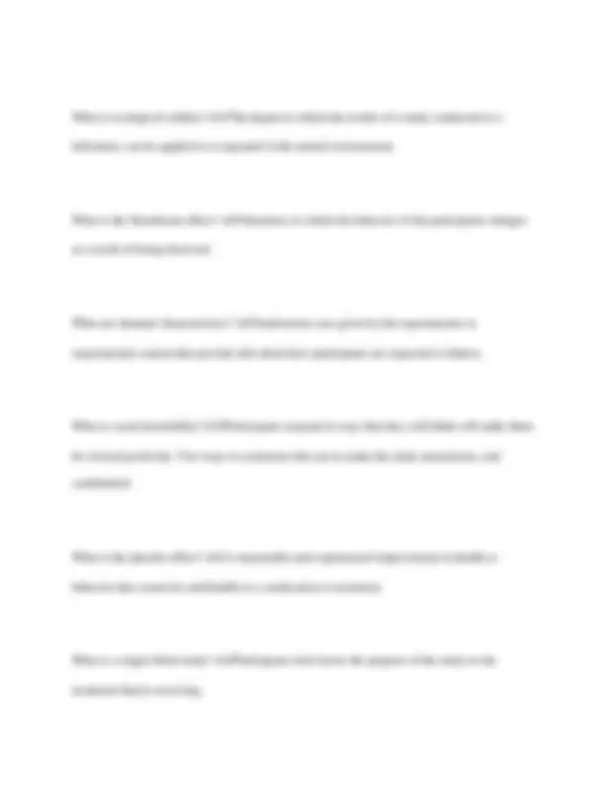
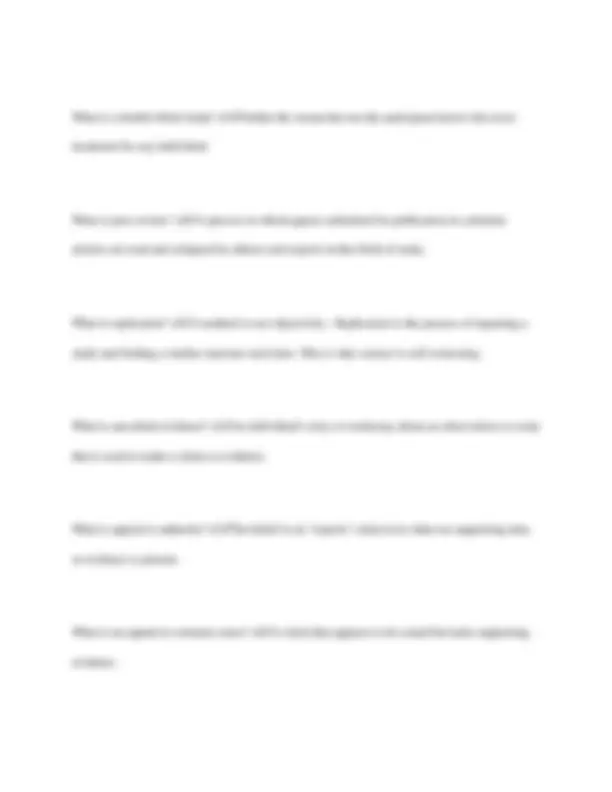
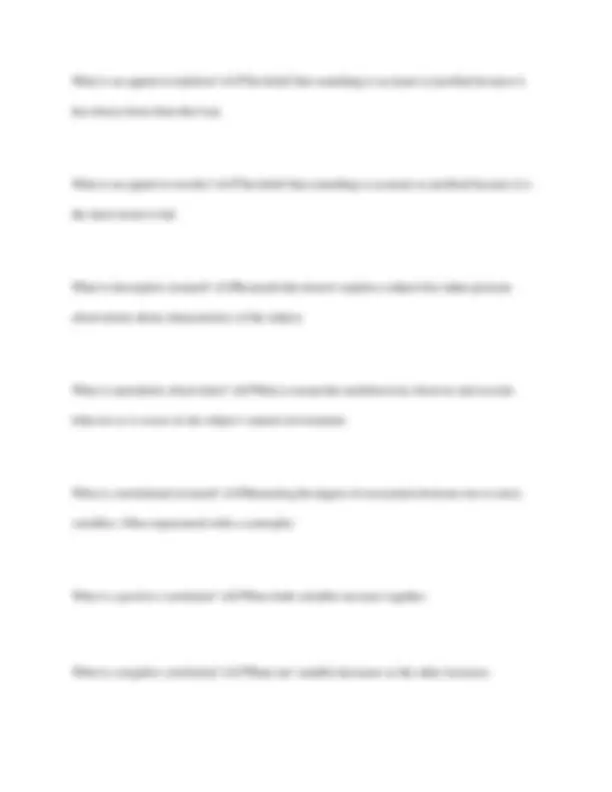
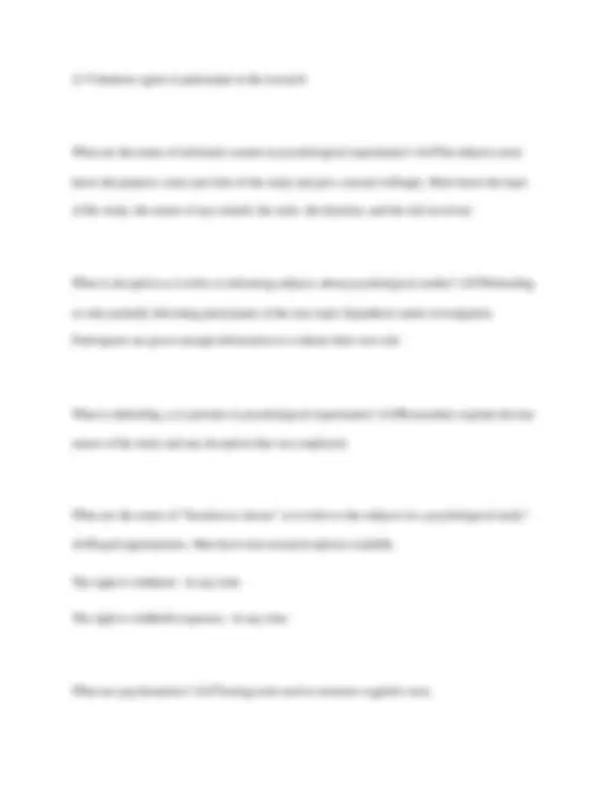
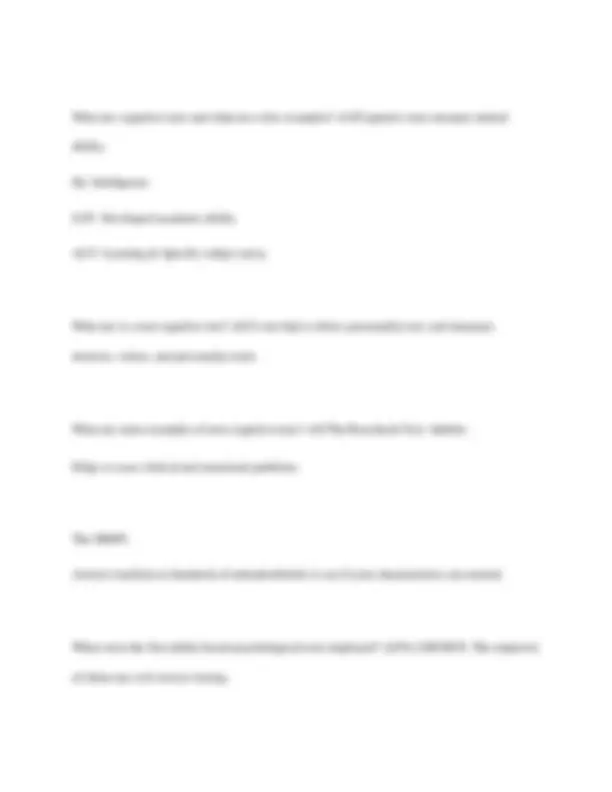
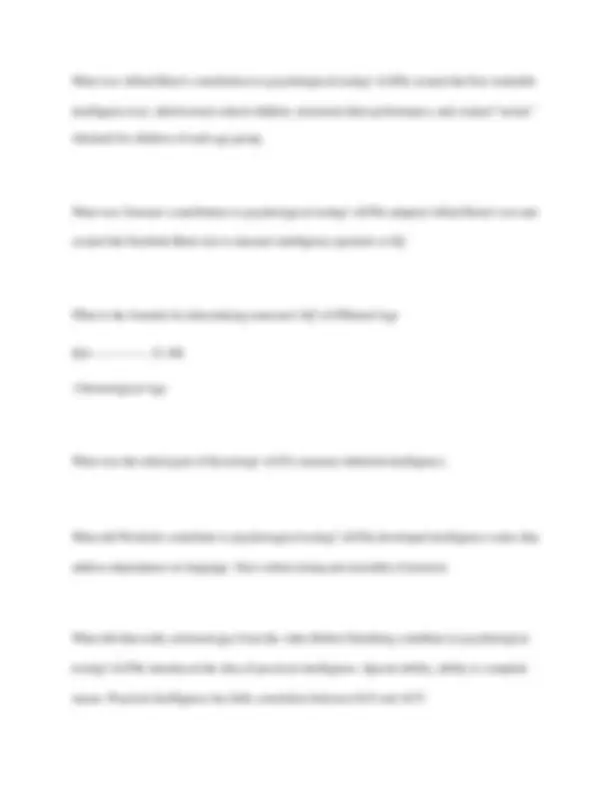
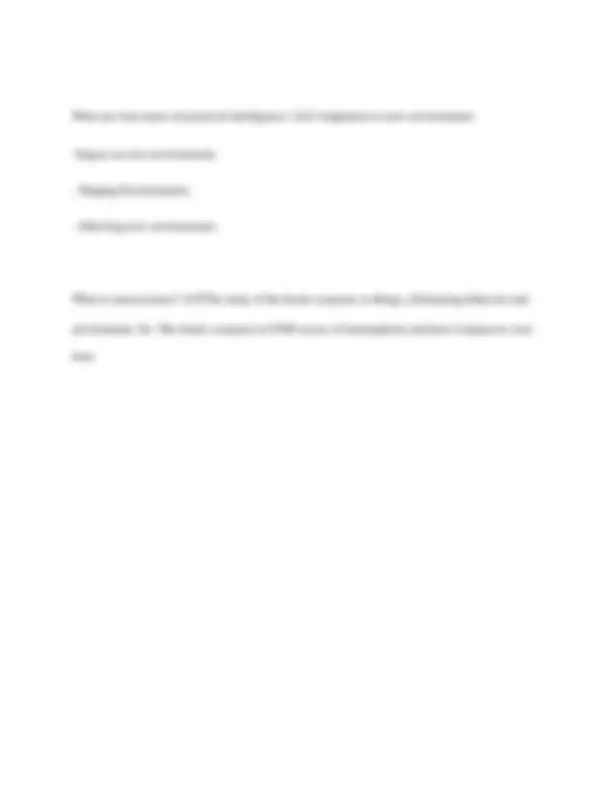


Study with the several resources on Docsity

Earn points by helping other students or get them with a premium plan


Prepare for your exams
Study with the several resources on Docsity

Earn points to download
Earn points by helping other students or get them with a premium plan
Community
Ask the community for help and clear up your study doubts
Discover the best universities in your country according to Docsity users
Free resources
Download our free guides on studying techniques, anxiety management strategies, and thesis advice from Docsity tutors
A comprehensive q&a covering key concepts in introductory psychology, from the definition of psychology and the scientific method to prominent figures and schools of thought like freud, behaviorism, and gestalt psychology. it's a valuable resource for students to test their understanding of core principles, theories, and historical contributions to the field. The questions delve into various aspects of psychology, including its history, major perspectives, and methods of study, making it suitable for self-assessment and exam preparation.
Typology: Exams
1 / 21

This page cannot be seen from the preview
Don't miss anything!














What is psychology? ✔✔Psychology is the study of behavior, thought, and experience.
What is pseudoscience? ✔✔Ideas that are represented as science but do not utilize principles of scientific thinking or procedure.
What is the scientific method? ✔✔The scientific method is a way of learning about the world through collecting observations, proposing explanations, developing theories, and testing those theories.
Can a hypothesis be proven? ✔✔No. Hypotheses are either confirmed or rejected.
What is a theory? ✔✔An explanation for a broad range of observations which can generate new hypotheses.
What are the three tenets of a theory? ✔✔Theories are not opinions or beliefs. Not all theories are equally plausible. Number of believers is not a way to legitimize a theory.
What is the biopsychosocial model? ✔✔A means of explaining behavior as a product of biological, psychological, and sociocultural factors.
What is scientific literacy? ✔✔The ability to understand, analyze, and apply scientific information.
What is critical thinking? ✔✔Involves exercising curiosity and skepticism when evaluating the claims of others with our own assumptions and beliefs.
What is the principle of parsimony? ✔✔The simplest explanation should be the one we accept. (Ex. Alien abductions. With all the discrepancies in the accounts of abductees, the simplest answer, that they have imagined it, should be the one we accept).
What is empiricism? ✔✔Knowledge comes through experience and observation.
What is determinism? ✔✔All events are governed by lawful cause and effect relationships.
What is Broca's area? ✔✔Part of the brain where Paul Broca found damaged in a patient which imputed speech production, causing the patient to only be able to say "Tan".
What is Wernicke's Area? ✔✔Patients with damage to this part of the brain could speak in normal-sounding sentences but with made up words.
What is psychosomatic medicine? ✔✔Medicine wherein cures are attributed to a belief in the treatment.
What is psychoanalysis? ✔✔A psychological approach that attempts to explain how behavior and personality are influenced by looking at unconscious processes. Freud pioneered this field by examining early childhood memories and aggressive or sexual urges.
What is the medical model, and who suggested the idea of it? ✔✔The medical model, as introduced by Freud, said that medical ideas can be used to treat disorders of emotions.
What were two ideas that Sir Francis Galton introduced to psychology? ✔✔The idea that heredity explains psychological differences. His discovery, however, led him to believe that some genes were superior to others, which led to eugenics.
What is eminence? ✔✔A term coined by Sir Francis Galton. He measured to what degree someone displayed eminence (A combination of ability, morality and achievement).
What was Willhelm Wundts contribution to psychology? ✔✔Established the first psychological laboratory and focused on how people sense and perceive with introspection.
What is structuralism? ✔✔An attempt to analyze conscious experience by breaking it down into basic elements and to understand how these elements work together. Focuses on permanent and unchanging elements of thought, as opposed to functionalism which looks at behaviors in context.
What was Edward Tichener's contribution to psychology? ✔✔A student of Wundt, Tichener introduced the idea of structuralism.
What is Functionalism? ✔✔The study of the purpose and function of behavior and conscious experience.
What was B.F Skinner's contribution to psychology? ✔✔A behaviorist that worked with how rewards effect behavior. Showed that organisms perform actions that have a reward but avoid those that do not. (Study done with mice and a lever).
What were Carl Rogers and Abraham Maslow's contributions to Psychology? ✔✔Humanistic Psychologists who were concerned about what the meaning is of personal experience. Denied the medical model and psychoanalytic model, saying that people should develop a sense of self rather than being diagnosed and having their problems labeled.
What were Hermann Ebbinghaus's contributions to psychology? ✔✔Mental processes could be studied even if we could not see them-- Ebbinghaus pioneered cognitive psychology and studied how people remember and forget information (the forgetting curve).
What was Frederick Bartlett's contribution to psychology? ✔✔Analyzed how memory is an interpretive process that involves cultural knowledge (films, TV). Bartlett proposed that we gauged what parts of TV and film are important enough to remember using cultural knowledge.
What was Norman Triplett's contribution to psychology? ✔✔Worked with early principles of social psychology, how people influence other people. ex. Cyclists ride faster when in the presence of other people.
What was Kurt Lewin's contribution to psychology? ✔✔Lewin is considered the father of modern social psychology. Behavior is a function of the individual and the environment.
What is applied psychology? ✔✔Uses psychological knowledge to address problems and issues across various settings and professions including law, education, clinical psychology, and business organization and management.
What is psychiatry? ✔✔A branch of medicine concerned with the treatment of mental and behavioral disorders.
What is Gestalt Psychology? ✔✔The idea that Psychologists need to focus on the whole of perception and experience, rather than its parts. Ex. Fechener said that if you were given an apple you would say "smoothe, red, hard..." but Gestalt psychology says that you would just say "Its an apple!"
What are symptoms of anxiety? ✔✔Physical fight or flight response and unpleasant cognitive thoughts. Sweating, increased heart rate, increased alertness...etc.
What is monism? ✔✔Mind and body are one. The mind is not separate from the body, and all human experiences are physical and from the brain.
What is dualism? ✔✔The mind and body are separate, but interact.
What did John Stuart Mill say about psychology and its philosophical roots? ✔✔Psychology should not be philospohy or speculation. In order to fully understand the mind, it must be a science.
What is objectivity? ✔✔Certain facts can be tested independently from the individual who describes them.
What is subjectivity? ✔✔When knowledge of an event is shaped by prior beliefs, expectations, experiences, and mood.
What are objective measurements in psychology? ✔✔The measure of an entity or behavior that, within an allowed margin of error, are consistent across all instruments and observers. These remain constant.
What is a variable? ✔✔What is being measured. The object, concept or event being measured.
What're a few instrumental ways that psychology and behavior can be measured objectively? ✔✔MRIs can view the brain and it's response to certain stimuli. Blood & Saliva tests can measure enzymes and hormones that effect behavior.
What is self reporting in psychology? ✔✔A method where responses are provided directly by the people being studied. Often, this is done by interview, survey or questionarre.
What're operational definitions? ✔✔Statements that describe the procedures and specific measures used to record observations.
When is a measure reliable? ✔✔When it is consistent across multiple observations and points in time.
What is validity? ✔✔The degree to which an instrument or procedure actually measures what it claims to measure. Is it a valid way to measure something?
What is ecological validity? ✔✔The degree to which the results of a study conducted in a laboratory can be applied to or repeated in the natural environment.
What is the Hawthorne effect? ✔✔Situations in which the behavior of the participants changes as a result of being observed.
What are demand characteristics? ✔✔Inadvertent cues given by the experimenter or experimental content that provide info about how participants are expected to behave.
What is social desirability? ✔✔Participants respond in ways that they will think will make them be viewed positively. Two ways to counteract this are to make the study anonymous, and confidential.
What is the placebo effect? ✔✔A measurable and experienced improvement in health or behavior that cannot be attributable to a medication or treatment.
What is a single-blind study? ✔✔Participants don't know the purpose of the study or the treatment they're receiving.
What is a double-blind study? ✔✔Neither the researcher nor the participant knows the exact treatment for any individual.
What is peer review? ✔✔A process in which papers submitted for publication in scholarly articles are read and critiqued by editors and experts in that field of study.
What is replication? ✔✔A method to test objectivity-- Replication is the process of repeating a study and finding a similar outcome each time. This is why science is self-correcting.
What is anecdotal evidence? ✔✔An individual's story or testimony about an observation or event that is used to make a claim as evidence.
What is appeal to authority? ✔✔The belief in an "experts" claim even when no supporting data or evidence is present.
What is an appeal to common sense? ✔✔A claim that appears to be sound but lacks supporting evidence.
What is the range of correlation coefficients, and what is the strongest correlation? ✔✔Coefficients range from -1.o to 1.0. The closer the coefficient is to the absolute value of 1.o, the stronger the correlation.
Do correlations reveal information about cause and effect of the two variables? ✔✔No. Correlations are not causality.
What is "the third variable problem"? ✔✔The possibility that a third and unmeasured variable is responsible for a well established correlation.
What is an illusory correlation? ✔✔Correlations that exist only in the mind and not in reality. Often lead to negative stereotypes.
What is random assignment? ✔✔A technique for dividing samples into two or more groups.
What is a confounding variable? ✔✔Variables outside of the researchers control that effect the result.
What is a dependent variable? ✔✔The observation or measurement that is recorded during the experiment and compared across all groups. The responding variable.
What is an independent variable? ✔✔The variable that the experimenter manipulates to distinguish between the groups.
What is the experimental group? ✔✔The group that is exposed to the independent variable.
What is the control group? ✔✔A group that does not receive treatment and serves as a comparison.
What is quasi-experimental research? ✔✔A research technique in which the two groups that are compared are selected based upon predetermined characteristics RATHER than random assignment. These are correlational studies that cannot determine what it is about the two groups that leads to their differences.
What is the institutional review board (IRB)? ✔✔A committee of researchers and officials at an institution charged with the protection of human research participants.
What are cognitive tests and what are a few examples? ✔✔Cognitive tests measure mental ability:
IQ- Intelligence
SAT- Developed academic ability
ACT- Learning & Specific subject areas
What are is a non cognitive test? ✔✔A test that is often a personality test, and measures interests, values, and personality traits.
What are some examples of non-cognitive tests? ✔✔The Rorschach Test- Inkblot:
Helps to asses clinical and emotional problems.
The MMPI:
Answer true/false to hundreds of attitudes/beliefs to see if your characteristics are normal.
When were the first ability based psychological tests employed? ✔✔In 2200 BCE. The emperors of china ran civil service testing.
What was Alfred Binet's contribution to psychological testing? ✔✔He created the first workable intelligence test, which tested school children, measured their performance, and created "norms" obtained for children of each age group.
What was Terman's contribution to psychological testing? ✔✔He adapted Alfred Binet's test and created the Stanford-Binet test to measure intelligence quotient or IQ.
What is the formula for determining someone's IQ? ✔✔Mental Age
IQ= -------------- X 100
Chronological Age
What was the initial goal of IQ testing? ✔✔To measure inherited intelligence.
What did Wechsler contribute to psychological testing? ✔✔He developed intelligence scales that address dependence on language. Non-verbal testing and assembly of pictures.
What did that really awkward guy from the video Robert Sternberg contribute to psychological testing? ✔✔He introduced the idea of practical intelligence. Spacial ability, ability to complete mazes. Practical intelligence has little correlation between SAT and ACT.